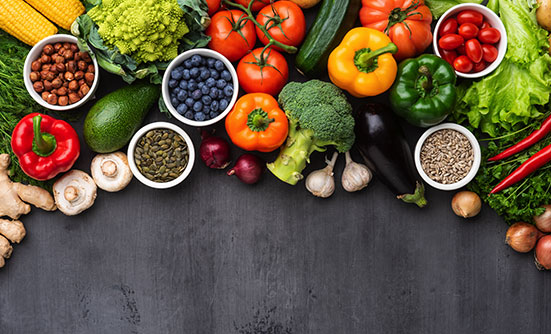For patients with pancreatic cancer, eating a well-balanced diet is important for having the best quality of life, strength, and response to treatment.1 However, getting good nutrition can be difficult, and patients with pancreatic cancer can speak with a registered dietitian to make a personalized plan for how to get proper nutrition.2
Why Does Pancreatic Cancer Cause Nutritional Problems?
By the time of diagnosis, up to 80% of patients with pancreatic cancer will have had unplanned weight loss. This weight loss happens because patients feel less hungry while their bodies are working harder and using more calories.3 Some patients may also have blockages to parts of the digestive tract or not have enough enzymes or proteins to absorb and digest the food they eat.4
Treatments for pancreatic cancer, including surgery, chemotherapy, and radiation therapy, may also cause patients to lose weight without trying.1 Patients who have surgery for pancreatic cancer are especially at risk for malnutrition and weight loss, because parts of the pancreas are removed and this makes it harder to make enough enzymes to digest and absorb nutrients from food.5
What Nutritional Treatment Is Used for Pancreatic Cancer?
Patients with pancreatic cancer who have had surgery and some who have not had surgery may need to take pancreatic enzymes (liquid or pill) with their food to help digest and absorb nutrients from the food they eat.1 Patients who have diarrhea may also need to take vitamins to replace the nutrients that their bodies are having trouble absorbing.5
Patients can do a lot to help their nutrition when they have pancreatic cancer. Eating smaller meals more often (5-6 meals spaced 3 hours apart) can be very helpful for gaining weight and getting enough nutrients.1 Patients should avoid alcohol but drink plenty of other fluids between meals to keep their bodies strong.1
Patients should eat plenty of foods containing protein, complex carbohydrates, healthy fats, vitamins, and minerals.6 Healthy protein can be found in chicken, turkey, fish, eggs, low-fat yogurt, milk, cheese, dairy substitutes, peanut butter, beans, and foods with soy.1 Complex carbohydrates and fiber can be gleaned from oatmeal, brown rice, whole wheat bread, and whole grain pasta.1 Instead of eating fried and fatty foods, which are hard to digest and can cause discomfort and diarrhea, patients should eat healthy fats like olive oil, avocados, nuts, and seeds.1
Nausea
Some patients do not feel like eating because of nausea. If this happens, there are medications to help.6 Some foods, like oatmeal, plain potatoes, toast, or dry cereal, are easier to eat when nauseated. Having small drinks between meals can also help.6
Diarrhea
Patients who have more than 4 loose bowel movements per day or who have stools that are more liquid than normal may be having trouble absorbing food.7 Diarrhea has many possible causes, and there are several medications that can give relief. Drinking plenty of fluids and eating 6 to 8 small meals throughout the day can help patients get proper nutrition. Foods like oatmeal, applesauce, and bananas may help combat diarrhea.7
Proper nutrition can make a big difference in how patients feel when they have pancreatic cancer. All patients can benefit from working with a registered dietitian to learn how eating right can increase strength and comfort while facing pancreatic cancer.
References
- Pearlpoint Nutrition Services. I have pancreatic cancer. What should I eat? https://pearlpoint.org/i-have-pancreatic-cancer-what-should-i-eat. 2018. Accessed November 15, 2019.
- Pancreatic Cancer Action Network. Pancreatic enzymes. www.pancan.org/facing-pancreatic-cancer/living-with-pancreatic-cancer/diet-and-nutrition/pancreatic-enzymes. 2019. Accessed November 15, 2019.
- Mitchell T, Clarke L, Goldberg A, Bishop KS. Pancreatic cancer cachexia: the role of nutritional interventions. Healthcare (Basel). 2019;7(3). pii:E89. doi: 10.3390/healthcare7030089.
- Sreedharan L, Kumar B, Jewell A, et al. Bridging clinic: the initial medical management of patients with newly diagnosed pancreatic cancer. Frontline Gastroenterol. 2019;10(3):261-268. doi: 10.1136/flgastro-2018-101002.
- Pancreatic Cancer Action Network. Nutrition following pancreatic surgery. www.pancan.org/facing-pancreatic-cancer/living-with-pancreatic-cancer/diet-and-nutrition/after-a-whipple-procedure. 2019. Accessed November 15, 2019.
- Pearlpoint Nutrition Services. Nutrition guidelines following a Whipple procedure. https://pearlpoint.org/nutrition-guidelines-following-a-whipple-procedure. 2018. Accessed November 15, 2019.
- Pancreatic Cancer Action Network. Diarrhea. www.pancan.org/facing-pancreatic-cancer/living-with-pancreatic-cancer/diet-and-nutrition/diarrhea. 2019. Accessed November 15, 2019.















